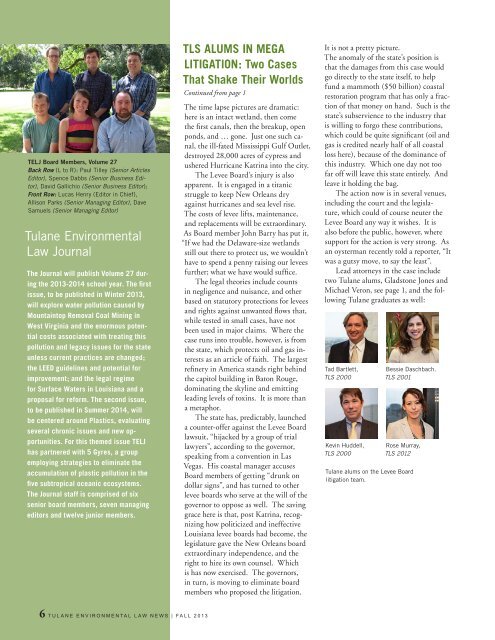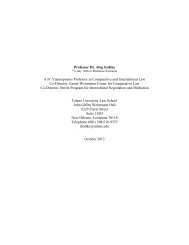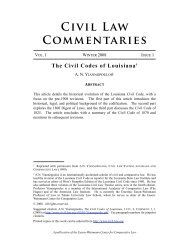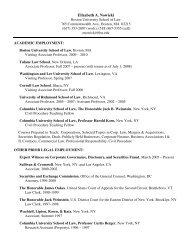environmental - Tulane University Law School
environmental - Tulane University Law School
environmental - Tulane University Law School
You also want an ePaper? Increase the reach of your titles
YUMPU automatically turns print PDFs into web optimized ePapers that Google loves.
TELJ Board Members, Volume 27<br />
Back Row (L to R): Paul Tilley (Senior Articles<br />
Editor), Spence Dabbs (Senior Business Editor),<br />
David Gallichio (Senior Business Editor);<br />
Front Row: Lucas Henry (Editor in Chief),<br />
Allison Parks (Senior Managing Editor), Dave<br />
Samuels (Senior Managing Editor)<br />
<strong>Tulane</strong> Environmental<br />
<strong>Law</strong> Journal<br />
The Journal will publish Volume 27 during<br />
the 2013-2014 school year. The first<br />
issue, to be published in Winter 2013,<br />
will explore water pollution caused by<br />
Mountaintop Removal Coal Mining in<br />
West Virginia and the enormous potential<br />
costs associated with treating this<br />
pollution and legacy issues for the state<br />
unless current practices are changed;<br />
the LEED guidelines and potential for<br />
improvement; and the legal regime<br />
for Surface Waters in Louisiana and a<br />
proposal for reform. The second issue,<br />
to be published in Summer 2014, will<br />
be centered around Plastics, evaluating<br />
several chronic issues and new opportunities.<br />
For this themed issue TELJ<br />
has partnered with 5 Gyres, a group<br />
employing strategies to eliminate the<br />
accumulation of plastic pollution in the<br />
five subtropical oceanic ecosystems.<br />
The Journal staff is comprised of six<br />
senior board members, seven managing<br />
editors and twelve junior members.<br />
TLS ALUMS IN MEGA<br />
LITIGATION: Two Cases<br />
That Shake Their Worlds<br />
Continued from page 1<br />
The time lapse pictures are dramatic:<br />
here is an intact wetland, then come<br />
the first canals, then the breakup, open<br />
ponds, and … gone. Just one such canal,<br />
the ill-fated Mississippi Gulf Outlet,<br />
destroyed 28,000 acres of cypress and<br />
ushered Hurricane Katrina into the city.<br />
The Levee Board’s injury is also<br />
apparent. It is engaged in a titanic<br />
struggle to keep New Orleans dry<br />
against hurricanes and sea level rise.<br />
The costs of levee lifts, maintenance,<br />
and replacements will be extraordinary.<br />
As Board member John Barry has put it,<br />
“If we had the Delaware-size wetlands<br />
still out there to protect us, we wouldn’t<br />
have to spend a penny raising our levees<br />
further; what we have would suffice.<br />
The legal theories include counts<br />
in negligence and nuisance, and other<br />
based on statutory protections for levees<br />
and rights against unwanted flows that,<br />
while tested in small cases, have not<br />
been used in major claims. Where the<br />
case runs into trouble, however, is from<br />
the state, which protects oil and gas interests<br />
as an article of faith. The largest<br />
refinery in America stands right behind<br />
the capitol building in Baton Rouge,<br />
dominating the skyline and emitting<br />
leading levels of toxins. It is more than<br />
a metaphor.<br />
The state has, predictably, launched<br />
a counter-offer against the Levee Board<br />
lawsuit, “hijacked by a group of trial<br />
lawyers”, according to the governor,<br />
speaking from a convention in Las<br />
Vegas. His coastal manager accuses<br />
Board members of getting “drunk on<br />
dollar signs”, and has turned to other<br />
levee boards who serve at the will of the<br />
governor to oppose as well. The saving<br />
grace here is that, post Katrina, recognizing<br />
how politicized and ineffective<br />
Louisiana levee boards had become, the<br />
legislature gave the New Orleans board<br />
extraordinary independence, and the<br />
right to hire its own counsel. Which<br />
is has now exercised. The governors,<br />
in turn, is moving to eliminate board<br />
members who proposed the litigation.<br />
It is not a pretty picture.<br />
The anomaly of the state’s position is<br />
that the damages from this case would<br />
go directly to the state itself, to help<br />
fund a mammoth ($50 billion) coastal<br />
restoration program that has only a fraction<br />
of that money on hand. Such is the<br />
state’s subservience to the industry that<br />
is willing to forgo these contributions,<br />
which could be quite significant (oil and<br />
gas is credited nearly half of all coastal<br />
loss here), because of the dominance of<br />
this industry. Which one day not too<br />
far off will leave this state entirely. And<br />
leave it holding the bag.<br />
The action now is in several venues,<br />
including the court and the legislature,<br />
which could of course neuter the<br />
Levee Board any way it wishes. It is<br />
also before the public, however, where<br />
support for the action is very strong. As<br />
an oysterman recently told a reporter, “It<br />
was a gutsy move, to say the least”.<br />
Lead attorneys in the case include<br />
two <strong>Tulane</strong> alums, Gladstone Jones and<br />
Michael Veron, see page 1, and the following<br />
<strong>Tulane</strong> graduates as well:<br />
Tad Bartlett,<br />
TLS 2000<br />
Kevin Huddell,<br />
TLS 2000<br />
Bessie Daschbach.<br />
TLS 2001<br />
Rose Murray,<br />
TLS 2012<br />
<strong>Tulane</strong> alums on the Levee Board<br />
litigation team.<br />
6 TULANE ENVIRONMENTAL LAW NEWS | FALL 2013





